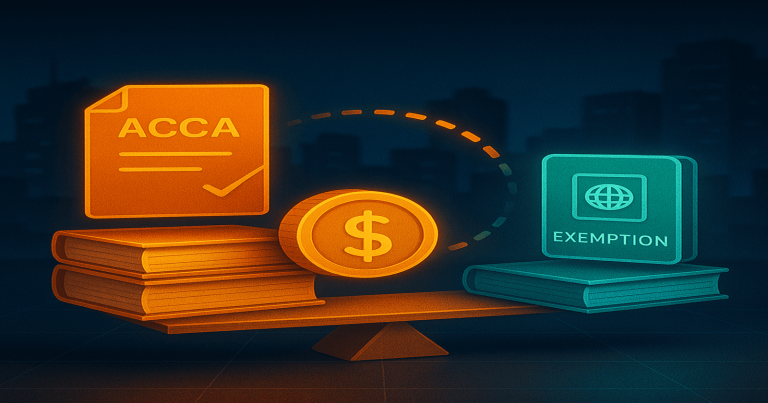ACCA exemption fees are the official charges paid when students skip specific ACCA papers based on their past degrees. These fees apply to each paper that ACCA exempts. In 2025, the cost is approximately ₹10,290 per paper for the Applied Knowledge level and around ₹11,970 per paper for the Applied Skills level.The exact amount depends on how many papers you skip. This system saves study time but needs proper planning to manage costs.
ACCA Exemption Fees Based on Qualification
The ACCA exemption fees vary depending on your previous academic or professional qualification. ACCA checks your degree or certification and matches it with its syllabus. If your course content is similar, you don’t have to appear for those exams. But you must pay a set fee for every paper you skip. This structure helps save time, but you still pay for each exempted subject.
Why Qualifications Matter for Exemptions?
Different students come from various study backgrounds. Some have done B.Com, some hold MBAs, and others are already chartered accountants. ACCA gives more exemptions to students with higher or more specialised qualifications. This is because advanced degrees often cover more of the ACCA syllabus. So, the better your qualification, the more exams you can skip—but the more you pay in exemption fees.
How Fees Are Decided by Qualification Level?
ACCA divides its exams into three levels: Applied Knowledge, Applied Skills, and Strategic Professional. Exemptions are allowed only in the first two levels. Each exemption in the Applied Knowledge level costs approximately ₹10,290 per paper, while each Applied Skills exemption costs around ₹11,970 per paper. Strategic Professional papers cannot be skipped. So, if your qualification earns 3 exemptions, you pay 3 times the cost per paper. This is how your total ACCA exemption cost is calculated.
Exemption Fees for B.Com Graduates
B.Com students usually get exemptions from three papers: Business and Technology (BT), Management Accounting (MA), and Financial Accounting (FA). These are part of the applied knowledge level. The ACCA exemption fee for B.Com graduates is ₹10,290 per paper, totaling approximately ₹30,870 for all three papers. This helps B.Com students move quickly into the next level of the ACCA program.
Exemption Fees for MBA Graduates
MBA students often qualify for 4 to 6 exemptions depending on their specialisation. For example, finance MBAs might skip more papers than HR MBAs. The exemptions are usually a mix of Applied Knowledge and Applied Skills papers.The ACCA exemption fees for MBA holders can range approximately between ₹42,000 and ₹73,500, depending on the number of papers exempted. Students must provide detailed course transcripts to prove eligibility.
Exemption Fees for Chartered Accountants (CAs)
Qualified CAs get the highest number of exemptions, up to 9 papers. These include all subjects at the Applied Knowledge and Skills level. Each paper costs between ₹10,290 and ₹11,970, so the total ACCA exemption fees for Chartered Accountants can exceed ₹1,00,000. ACCA accepts ICAI certification and final results for processing CA exemptions. This saves CAs up to 2 years of study time.
Other Qualifications and Their Fees
Students from other professional backgrounds, like CPA, CMA, or ICWAI, also get exemptions. The number of papers and total fees depend on how much their course content matches ACCA’s syllabus. Students can use the ACCA exemption calculator to check the exact documents and fees. No matter the qualification, each exemption must be paid for separately.
| Qualification | No. of Papers | Exemption Level | Estimated Fees (INR) |
| B.Com | 3 | Applied Knowledge | ₹30,870 |
| MBA | 4–6 | Knowledge + Applied Skills | ₹42,000 – ₹73,500 |
| CA (India) | Up to 9 | Knowledge + Applied Skills | ₹84,000 – ₹1,05,000+ |
| CPA / CMA | 5–7 | Mostly Applied Skills | ₹52,500 – ₹84,000 |
These values change based on current ACCA pricing and the number of eligible exemptions.
Why Paying Exemption Fees is Worth It?
Even though students pay for exemptions, they save time and effort. They skip learning topics they have already studied before. Also, they can complete ACCA in fewer months. Paying the ACCA module exemption fees is much better than repeating the same subjects. It gives students a faster route to becoming ACCA members.
How to Calculate Your ACCA Exemption Fees?
Before paying any money, you must check how many exemptions you get. ACCA offers a free online tool to help you. This tool is called the ACCA exemption calculator. It shows how many papers you can skip and what it will cost. This helps in planning your budget correctly.
Steps to Use the ACCA Exemption Calculator
Visit the ACCA website and go to the exemption section. Enter your country, university name, and qualification. The tool will show eligible exemptions and fees. This includes the complete ACCA exemption fee structure. You can also download the list to plan further steps.
Sample Fee Table for 2025
| Paper Level | Exemption Fee Per Paper |
| Applied Knowledge | ₹10,290 |
| Applied Skills | ₹11,970 |
| Strategic Professional | No exemptions allowed |
Use this table to know the ACCA module exemption fees and calculate your total cost. The calculator updates regularly with fee changes.
ACCA Exemptions for Indian and International Students
ACCA gives exemptions to both Indian and international students. If your course has subjects like finance or accounting, you may qualify. ACCA checks each qualification based on content and level. It also checks if the course is from a recognised institute. Students need to submit all documents during the application process.
Indian Students and Exemption Pattern
Students from India often come from B.Com, M Com, MBA, or CA backgrounds. ACCA usually gives them 3–9 exemptions. Students pay the same amount, but in INR after conversion. The ACCA exemption fees in india depend on exchange rates. Make sure to add bank and currency charges while calculating your total cost.
International Students from Pakistan and Others
Students from Pakistan often ask about the ACCA exemption fees in Pakistan. Their degrees also get 3–6 exemptions. These are mainly from Applied Knowledge and some Applied Skills levels. Fees are the same in GBP, but the final payment includes currency conversion. Students must upload certified academic documents and translations if required.
ACCA Exemption Fees: Full Breakdown and Payment Process
The payment process is simple and online. Students apply for exemptions after registration. Once ACCA approves your documents, you can pay the fee. These fees appear in your ACCA account. You must pay the full amount using an international payment method.
Steps for Payment
First, register as a student on the ACCA portal. Then upload documents like degree certificates and transcripts. ACCA checks your eligibility and grants exemptions. You’ll see the ACCA exemption application status in your account. After that, pay the full exemption fee before the deadline.
Important Reminders
Always check the ACCA exemption deadline. Missing it means waiting for the next exam cycle. ACCA does not allow part payment for exemption fees. Once you pay, the fee is non-refundable. Make sure all your uploaded documents are clear and certified.
How to Apply for ACCA Exemptions Step-by-Step
The process to apply for ACCA exemptions is easy and entirely online. Students must upload documents proving their qualifications and pay the required ACCA exemption fees. ACCA reviews each application carefully and usually gives a decision in 7 to 10 working days. Students get updates about their application via email and the ACCA student dashboard. Before you begin the process, it’s best to prepare all your essential records, like your ID, degree certificate, and mark sheet.
Step 1: Register on the ACCA Website
Becoming a new ACCA student is the first task every student must complete. Log on to the official ACCA website, www.accaglobal.com, and click the “Apply Now” or “Student Registration” button. Basic information is required, such as their full name, e-mail address, date of birth, and contact number. Also, choose the test centre and country where you want to live. After registration, applicants will receive their ACCA registration number, which is valid for all future processes.
Step 2: Fill Out the ACCA Exemption Form Online
After doing so, log in to your ACCA account using the email address and password you used while creating the account. The next step would be going to ‘My Qualification’. Look for a link to fill out the ACCA exemption application form there. This form asks questions about the educational qualifications that are being exempted. Name the qualification (e.g., B.Com), enter the university’s name, and include the year completed. Ensure that the details align with the records available to you.
Step 3: Upload Educational Documents
Upload academic records after filling out the exemption form. This includes mark sheets, final degree certificates, transcripts, and a syllabus. All these must either be in English or translated into English. Scan clearly into PDF or image formats. For instance, upload the ICAI membership certificate and the final result if applying as a CA. All these are needed to help ACCA verify your eligibility under the ACCA exemption.
Step 4: Use the ACCA Exemption Calculator
Once all documents are uploaded, it’s time to utilise the ACCA exemption calculator to determine how many papers you could request an exemption from. This calculator can be found on the ACCA website. You must only input your country, institution, and qualifications to check your respective exemptions. A list of ACCA papers will appear and indicate whether they are exempt. This gives you a breakdown of your total ACCA exemption fee structure before payment.
Step 5: Pay the Exemption Fees
After getting confirmation from these bodies about their exemptions, members had to pay the exemption fees via the ACCA system, which set out the cost per paper and total; members may use any debit card, credit card or even an international bank card. There is no allowance for part payment; payment has to be made in full. The total payment depends on the number of papers exempted and whether they are Applied Knowledge level or Applied Skills. Your dashboard will show a successful transaction after the payment is complete. Step 6: Submit the Application for Approval
Step 6: Submit Application
Once your documents have been uploaded and payments made, submit your application for exemption on ACCA’s end. You’ve now successfully applied for the ACCA exemption application. Now, ACCA will check your documents against the eligibility criteria. The review process usually takes about 7 to 10 working days. If any document is found missing or unclear, it will be emailed to you for rectification. Therefore, check your email frequently to get updates on the status.
Step 7: Track Your Application Status
Check your ACCA account’s “My Qualification” section to view your exemption status. Should the exemption applications be approved, the list will appear in “Exempted Papers.” If any paper is missed, ACCA will have grounds for the denial. You may either upload documents again or seek assistance from ACCA support. After this, the final ACCA exemption fee will be secured from changes.
ACCA Exemption Fees FAQs
1. What are the ACCA exemption fees per paper?
ACCA charges ₹10,290 per paper for the Applied Knowledge level and ₹11,970 per paper for the Applied Skills level. Students pay this amount for every exam they are exempted from. These fees apply even though you don’t write the exam. You pay to receive formal credit for the paper skipped.
2. How do I know if I am eligible for ACCA exemptions?
Use the ACCA exemption calculator on the official ACCA website. Enter your qualification, university name, and country. The tool shows which papers you can skip. ACCA grants exemptions only if your past studies match at least 70% of their paper syllabus. Always upload verified documents to prove your eligibility.
3. Can I apply for exemptions after ACCA registration?
Yes, you can apply for ACCA exemptions after registration, but it is best to use them during registration. Delaying may cause you to miss the ACCA exemption deadline. Once you pass a higher-level ACCA paper, you can no longer claim exemptions for lower-level papers.
4. What documents do I need for the ACCA exemption application?
You must upload your mark sheets, degree certificate, and transcripts. You must submit your ICAI membership certificate and final result. All documents must be clear, certified, and in English if you are a CA. Uploading incomplete or blurred documents can lead to rejection or delay.
5. Are there ACCA exemption fees for ACCA affiliates?
No, ACCA affiliates have already completed all ACCA exam papers. They do not need to claim exemptions. Exemptions are only for new students joining ACCA with prior qualifications like B.Com, MBA, CA, CPA, etc. Affiliates only need to complete their work experience and ethics module.


